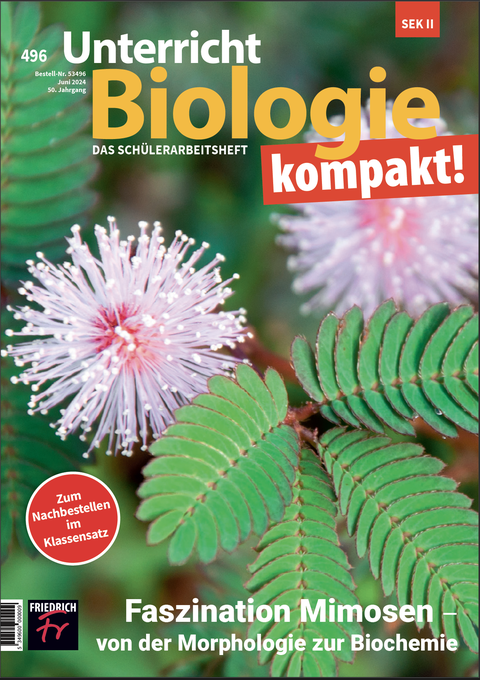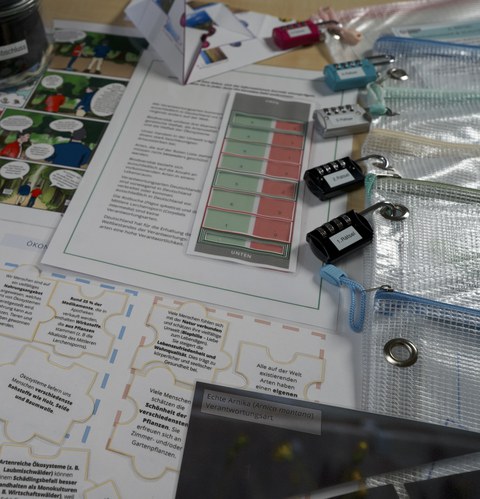Playful / digital discovery of plants and biodiversity
Plants receive less attention and interest with increasing age and grade. Understanding and appreciating their importance for life and the associated dangers of their "extinction" requires, among other things, botanical and systemic knowledge, positive attitudes and plant awareness, as well as an interest in sustainability. In everyday teaching, however, botanical topics are usually perceived by students as complex, boring and not very vivid. By selecting real-life botanical phenomena and activating learning methods using digital technologies and games, this research area aims to develop and test innovative teaching-learning approaches in the plant world for the conservation of botanical species and biodiversity.
The "PlantPLay" research area explores the perception and presence of botanical learning content and its didactic design from different perspectives:
Teaching materials, especially textbooks, are essential for motivating and effective biology teaching. However, studies show that, among other things, plant topics are given less space in biology textbooks than zoological aspects, and examples from the animal kingdom are used rather than plant examples.
Therefore, a central aim of this line of research is to examine the presence of plants and botanical content in existing teaching materials/school textbooks and to develop and disseminate innovative, motivating botanical teaching and learning materials.
- In cooperation with partners from Turkey, textbooks are analysed comparatively.
- Impressive plants and botanical phenomena are regularly prepared and published in practical teaching publications.
The anthropogenic loss of biodiversity, often associated only with the loss of animal species and not plant species, is one of the most serious problems of the 21st century. However, in their functional role as primary producers, plants are essential for stable ecosystem processes and form the basis for countless forms of life, including humans.The disparity in plant awareness and the low interest of learners in plants is a significant cause and at the same time a key challenge for the development of botanical conservation education programmes. How can an educational programme be designed that makes learners aware of plants and sensitises them to the need to conserve them? We are seeking answers to this question in our research on the use of game-based and digitally supported learning methods in the context of botanical phenomena, biodiversity education and ESD.
- Effect of game-based learning methods in comparison - Escape Game vs. Mystery - in the context of types of responsibility and biodiversity conservation
- Playful, cooperative and digitally supported perception and exploration of plants in the Botanical Garden - Escape Ralley with Aristolochia, Sassafras & Co.
- Encounter everyday ideas about plant movement with interactive, digital and differentiated learning paths
|
Project members (International) Project Cooperations Duration: since 2023 (ongoing) |
Meier, M. (ed.) (2024). Faszination Mimosen - von der Morphologie zur Biochemie [The fascination of mimosa - from morphology to biochemistry]. Unterricht Biologie kompakt, 496.
Henze, L., & Meier, M. (2024). Pflanzen in Bewegung: Darstellung einer interaktiven, multimedialen und differenzierten Lerneinheit zur Thematik Bewegungsphysiologie von Pflanzen [Plants in motion: Presentation of an interactive, multimedia and differentiated learning unit on the topic of movement physiology of plants]. BU Praktisch, 7(1). https://doi.org/10.11576/bupraktisch-6774
Meyer-Odewald, L. & Meier, M. (2023). Lebewesen im Fokus – Natur fotografisch kreativ erkunden und entdecken [Living creatures in focus - exploring and discovering nature creatively through photography]. In N. Tramowsky, J. Meßinger-Koppelt & T. Irion (Eds.), Naturwissenschaftlicher Sachunterricht digital (pp. 80-83). Joachim Herz Foundation.
Henze, L., Göhre, A. & Meier, M. (2025). Spielend Lernen? Entwicklung und Evaluation eines Educational Escape Games und Mysterys für den Biologieunterricht [Learning by playing? Development and evaluation of educational escape games and mysteries for biology lessons]. Poster at the 26th International Spring School of the Didactics of Biology Section of the VBIO, HU Berlin, 04.03. - 07.03. 2025.
Akpinarli, S., Göhre A., Köseoglu, P. & Meier, M. (2025) Nature Meets Technology: Digital Game-Based Learning in Botanical Gardens with Pre-Service Teachers. Poster at the 26th International Spring School of the VBIO Didactics of Biology Section, HU Berlin, 04.03. - 07.03. 2025.
Akpinarli, S., Köseoglu, P. & Meier, M. (2023). The Presence and Inclusion of Plant and Animal Photos in Biology Textbooks: An Exploratory Comparison Between Türkiye and Germany. Poster at the International Conference of the Didactics of Biology Section (FDdB in VBIO) 2023, 18.09. - 21.09.2023.


